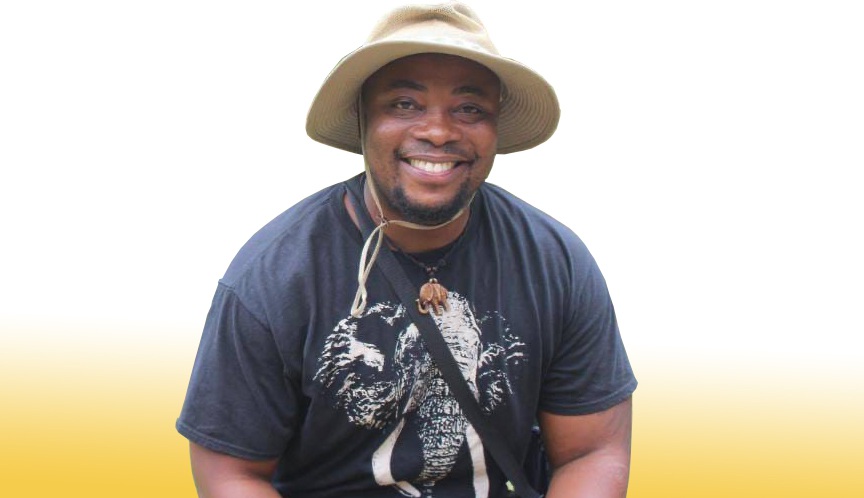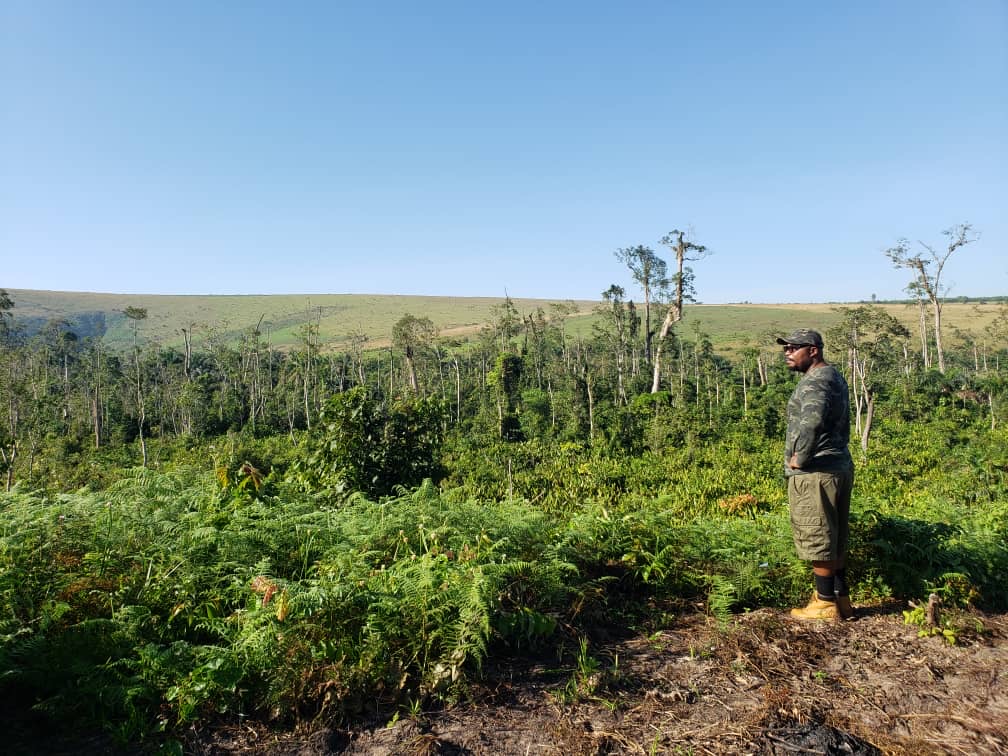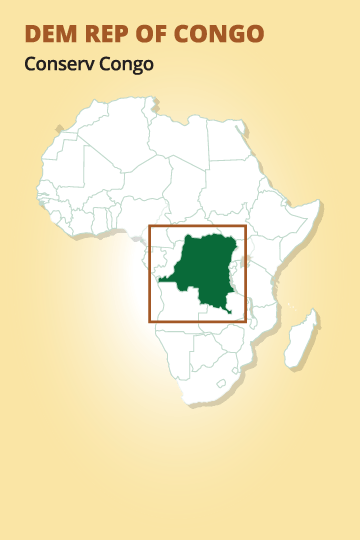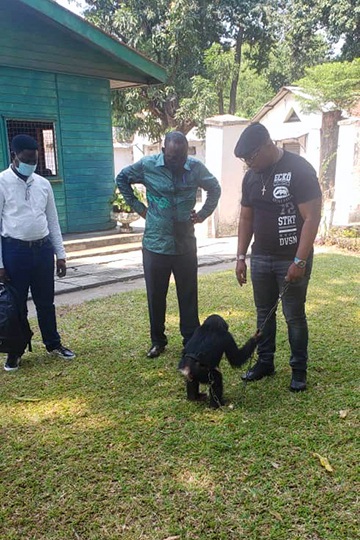
by Jean Fleming
Adams Cassinga is a passionate defender of Africa’s wildlife and biodiversity – especially in his homeland, the Democratic Republic of Congo (DRC). He is a National Geographic Emerging Explorer for 2020, and his work is featured in the new documentary, Planet Without Apes. But he didn’t start out in conservation. In fact, he was a mining executive. Then the forest called him, and he answered, founding Conserv Congo, a nonprofit which investigates wildlife crime and brings traffickers to justice. He shared his story in a recent interview.
PASA: What made you decide to start Conserv Congo?
Adams Cassinga: I never planned to start Conserv Congo. At the time, I was still in the mining industry as an executive. I remember catching my flight from Entebbe, Uganda. I was going to a site in the Democratic Republic of Congo, where it borders South Sudan. This was the first time I’d ever flown over the tropical forest. It was so impressive, that for the two years I worked at this site, my heart was literally in the forest.
While I was on site, I saw how we managed the environment, how we polluted the rivers, how we chopped down the trees, how the animals were being killed. This site was close to Garamba National Parks, one of the most biodiverse areas we have in the country. I kept thinking, what can I do to be part of the solution instead of being part of the problem in preserving that forest?
So I resigned two years later. At the time, I did not know how to get into conservation. I went to Kinshasa, our capital city, where I got in touch with the Ministry for Environment. I wanted to volunteer my skills and time and energy toward conservation. They couldn’t help me because they thought I was looking for a job. After explaining to them that I wasn’t looking for a job, but was looking to be part of the solution, they advised me to look at opening a nonprofit organization.
You must bear in mind that here in the DRC, like in lots of African nations, opening a nonprofit org is more costly than opening up a business. It was expensive and it was a headache. You have to go to numerous offices and abide by those laws and rules before you can be operational. But eventually, in 2013, Conserv Congo was established.
Founding Conserv Congo was not intentional. It was the only way to respond to the crisis as I perceived it after watching all that was going on around our country in terms of nature conservation challenges. Hence the name Conservation of the Congo (Conserv Congo). So it was a creation of necessity more than anything else.
Conserv Congo was conceived to preserve the biodiversity of the congo basin and we do that by fighting the scourge of poaching as well as wildlife trafficking. We also have two additional objectives: to empower the youth and the community at large with environmental education and to use agriculture and farming as both an alternative to poaching and also to curb the intense food insecurity we have in the country and the region at large.

Cassinga conducts an inspection for Conserv Congo’s new sanctuary


Cassinga hands over a rescued chimpanzee to authorities in Kinshasa, DRC.
PASA: What can you tell us about wildlife trafficking in DRC?
AC: In the DRC, wildlife trafficking is a huge problem. In fact – and I have verified this – I can tell you that when they talk about wildlife trafficking or illegal wildlife trafficking in general, at least 60% of it is in the DRC.
The Democratic Republic of Congo is actually the hub. It is the safest haven for wildlife criminals on the African continent. The causes are many. It is a very complex issue and does not have just one cause. But amongst the causes I can name, there is corruption number one, greed, you have poverty, you have unemployment, you have ignorance, you have lack of good governance, you have colonial past.
PASA: Describe how you and your team work on a case.
AC: Conserv Congo’s law enforcement work is subdivided into four distinct departments. The first department is the department of investigation. This is where we send investigators on the field. They collect and verify info, and when they return to the office, together we sit down and analyze the information. Once we have a lead, we assign a particular investigator to the case. This means he does surveillance, he does intelligence gathering. He builds up a case to the point that before we approach the person, who we refer to as a target, we already have proof that he is a trafficker. The investigator links the evidence that we already have to the target.
Because wildlife crime is very difficult to prove in our courts of law, we have to organize what we call a “flagrance.” This means we have to catch the poacher or trafficker with his hand in the sack so that we can prove the crime. It is a difficult job to do, it is very stressful and draining. We have investigators who are well trained and do this with a lot of passion, and usually we pull this off.
Once this has happened, the information is passed on to our second department, the department of operations. This group takes care of the arrests. They work closely with law enforcement and other security agencies. They share information and together, we work with the police to make the arrest. This department also makes sure that no intelligence gets into hands we would not wish to have such information. We also make sure that there is no police brutality, there is no abuse of power and that even though they are criminals, they are being arrested with dignity.
Once the trafficker reaches the police station level, the department of operations role ends. They will now pass the case to the legal department. The legal department’s main mission is to counter corruption and bribery. They also do jail visits to make sure that the criminals are still behind bars and that they are not trying to bribe their way out or trying to escape. They follow up right until the last day that people get convicted.
When we jump from that , we pass it to the department of media. The department of media uses information as an influence in our work. There is a way that we can share information that can put a politician in a position where he can no longer be bribed. There is a way that we can use information that can make other members of a wildlife crime gang flee town. There is a way that we can use information to our advantage and this department makes media work for us. As a former journalist, I know that information is power, data is power, and if you use it wisely, it gets results.
PASA: How does Conserv Congo collaborate with sanctuaries?
AC: Sanctuaries are a great extension of our work. When Conserv Congo does its work, we’re only doing 50% of the job. If I arrest these guys, where can I take these animals to? The zoo? I cannot take them to the zoo. Therefore, sanctuaries play one of the greatest roles in rescuing these animals. You cannot talk about a rescue if you do not guarantee the life of this animal after that rescue – and sanctuaries are doing that. They are that place where the animal is given a second chance at life. They are also rehab centers where animals can be corrected and reintroduced into their natural habitat.
We appreciate the scientific knowledge that sanctuaries bring to the process. Even though we do the work we do, we are more soldiers, we are more law enforcement. But animals need special care. They need special treatment, a special place, they need a program, they need nutrition, they need safety – and all of this, sanctuaries are the ones which offer that.
In the DRC, I still believe we do not have enough sanctuaries. Hence, next year we are planning to open up a small sanctuary ourselves. We will not accommodate great apes because there are already so many organizations caring for those. We will take care of the smaller monkeys. And there is a reason for that. We do field work and every time in our field work we come across monkeys being butchered. And our fear is that by the time we have protected all the great apes, we’ll realize that all the smaller monkeys that we neglected have disappeared completely. We think that this could be the beginning of what is going to ensure the future existence of all these monkeys.
We have a very close relationship with the sanctuaries already established in the country, such as Lola ya Bonobo, who are doing a great job, such as Lwiro, such as JACK in Lubumbashi, and a new one called P-WAC where we have sent a couple of apes and a few monkeys.
However, I still feel like we have some work to do, to put on paper the rules of the game, so we know how to engage. For instance, sometimes when we rescue an ape in Kinshasa, we find out that two sanctuaries are all interested in having this animal. So we do not know the right rules on who to surrender the animal to, who takes care of which costs, because we are having a problem with resources. These are some of the nitty-gritties we want to work with PASA to clarify this.
We have to go into it as a coalition. If we work in synergy, no one can beat us.
“Sanctuaries are a great extension of our work. If I arrest these guys, where can I take these animals to? You cannot talk about a rescue if you do not guarantee the life of this animal after that rescue – and sanctuaries are doing that. They are that place where the animal is given a second chance at life.”
PASA: Why is conservation education part of your program mix?
AC: Education is a great complement of conservation, especially when we are doing law enforcement. There is no way you can say you’re trying to enforce laws that have not been explained to the community. Unfortunately, we do not live in a country where the state is so responsible. We live in a country where the state claims to have other priorities. Therefore, we as the public and a civil society, have got to step up and help.
When you look at it closely, ignorance is a great part of the problem. Many people, including those who are supposed to take care of our natural heritage, they suffer from ignorance. If you look at my post on Twitter recently, there was a zoo keeper who dressed a little bonobo in clothes like a clown. They were doing this to attract people to the zoo. I don’t think they were doing it maliciously. I think it was just ignorance because nobody has ever told them that this is not right.
We live in a country where people get jobs based on affiliation not on competencies. So we have the education mandate, because the government has failed to do it. We as the civil society have got to meet them halfway and do it.
We target young people between ages 12-18. Currently our program Conservation through Education has 2000 children from 11 schools. We provide them an environmental talk once a week in each school. We have seen a huge positive change since we started. So you can imagine if we can empower 100 schools, the change that it can bring about. The change may not be seen now, but I guarantee you in 5, 10 years, things are going to change.
I wish somebody had told me about this when I was young. What I am doing is a passion I developed in adulthood, but if we can teach these young children how to behave, how to protect these other beings, that we do not live on this planet alone, that we share it with other beings, I think that the world is going to be a better place in the future.
PASA: How does food insecurity in DRC impact the wildlife trade?
AC: Food insecurity is another big problem and a cause of wildlife trafficking and poaching in general. This is because here in the DRC, 80% of our food is imported. From China, South Africa, and from Europe. We do not produce enough food to feed our mouths. When you go to areas where there is rain everyday, great sunshine on a daily basis, but people have got no knowledge on how to till the land.
There are many people here who cannot afford a kilogram of beef, which costs about $10, in a country where an average person earns $100 a month. In Kinshasa alone, which is almost the size of Rwanda, the entire republic of Rwanda, we do not have 2000 heads of cattle. So you can imagine anything that moves becomes meat. People are trying to supplement their protein intake.
Therefore another of our objectives is to use agriculture and farming as a tool not only to fight poaching, but also to fight food insecurity. So we have kickstarted a small farming project on the outskirts of Kinshasa. We do not only raise domestic animals, we also till the land. This year we planted about 20 hectares of maize and cassava. We think this will encourage people to look into agriculture as an alternative to poaching.
However, the culture here, especially in the northwest of the country, has always been subsistence hunting and fishing. So they have no knowledge. And those who do have knowledge have no seeds. Those who have seeds, they don’t have a tractor. And those who have a tractor, they don’t have fuel. So we need resources to keep this going.
PASA: What gives you hope in your work?
AC: There are so many things which give me hope. For instance, when it comes to wildlife trafficking, you must remember that, after colonial times, since the 1960s, nobody has ever served jail term for a wildlife crime until 2018 when Conserv Congo got three bonobo traffickers convicted. That gives us hope.
Currently we have six cases in court, many traffickers in custody, and other investigations that are going well. We are struggling – we do not have a budget, we don’t have an office, we don’t have salaries, we don’t have nothing, but with meagre means we manage to get results. And we still anticipate that we are going to get international traffickers behind bars when the time comes.
Another hope is when I look at the young children that we talk to – the shift in them. If you walk around Kinshasa today, you will find people who talk about a small organization which is arresting people who dabble in wildlife criminal activities. We want to create a climate where people not only fear to do evil, but fear the punishment that comes with it. These laws were not established to be figurative, they were established to be utilized to scare people off. If we are doing that, we are doing great work.
If you go into the markets and see the number of wildlife for sale, it has really decreased in the last two years compared to the time we began.
There’s also another thing which gives us hope when we start seeing organizations like PASA giving recognition to the work. Because we believe synergy always wins. In the past we were all dispersed, hence we did not achieve much. Now that we start building relationships, partnerships – we believe that we’re going to conquer this.
We look forward to a time perhaps in five or ten years where we can decrease wildlife trafficking up to 80%. We know that the problem will never be completely eradicated but if we can control it, I think we can live with it. We are on the right track.
We started off in a very difficult situation and it’s not today that we’re going to give up. There is definitely hope – especially if we work in synergy.
PASA: Can you share a favorite success story?
AC: I remember when I started, I did investigations, operations, and legal follow ups. I did this for two or three years on my own. Now, we have 17 investigators in Kinshasa, and 52 investigators across the country. I’m relieved that I have other people who have bought into the idea. And you must understand that we don’t get paid. We do this as activism. We do this for the love of mother nature, we do this for the love of humanity. We do this with passion, we do this for our country, we do this for our people. That is one success story on its own.
I can tell you one concrete success story. In 2018, we investigated three traffickers. One was trafficking 22 bonobo hands, two were trafficking live baby bonobos. We made our investigation which led to arrest. Eventually we fought in court – without a cent. Thanks to the synergy at work there, we got the conviction. They were sentenced to six months in prison and five thousand dollars each to the state. The six months were really minute, minor to what the law provisions, but we were glad because since 1960, nobody, not even the state, managed to arrest anybody in this whole country on a wildlife crime.
By so doing, we have opened it up. Since then we have gotten seven more convictions. We are sitting at ten now. All of this from a small organization which has no office, which has no budget, which pays no salaries. But we get the results. We are really proud of ourselves. And we are proud to have other people who are beginning to notice us, giving us the support we need. Together we can do more.
PASA: How can people help support your work?
We are in dire need of support – of all kinds. Financial support can be donated online. Sometimes, people look at it and think every support has to be financial, but that is not true. We can also use other support which is not financial. For instance, volunteers – you could volunteer your skills or time.
Perhaps you do not have the money to come down to Africa or the Congo. Then you can plant a tree – you can spread the word about us, about this organization in the heart of Africa doing amazing work. You can recommend us, invite us to a workshop or conference where we can talk and perhaps get a donation. You can publish on your social media.
There is so much you can do to support us, beginning by spreading the word. Because we are ready to fight the problem.
